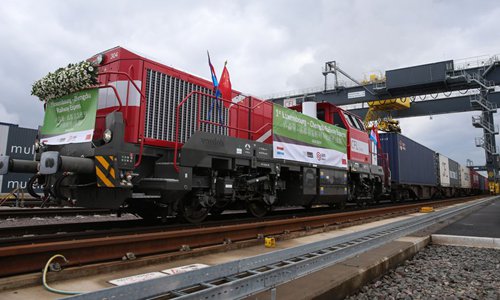HOME >> BUSINESS
Shorter market access negative list unveiled
By Huang Ge, Li Qiaoyi and Ma jingjing Source:Global Times Published: 2019/11/22 19:33:40

The first Luxembourg-Chengdu freight train starts at a cargo train station in Dudelange, Luxembourg, April 4, 2019. A new railway line for freight trains between Luxembourg and Chengdu, a city in southwest China, was launched here on Thursday, with the first train loaded with 41 containers on its way to China. Photo:Xinhua
The 2019 version of the list includes 131 entities, removing 20 items from the 2018 version. The updated restrictions will be tried mainly in the services industry, said the National Development and Reform Commission (NDRC), China's top economic planner.
The ease of approval will be granted to new sectors such as nursing homes for the elderly, social welfare and fire control services institutions.
The list will help the Chinese market play a decisive role in resource allocation, push forward the continuing ease of market access and stimulate market entities, particularly the private economy, the NDRC noted.
The new nationwide negative list also showed the country's commitment to provide equal treatment to domestic and foreign companies, experts said.
China is already a very attractive market for global investors and the revised negative list that allows for investment in more sectors is a positive move, V Shankar, CEO and partner of Gateway Partners, a Cayman Islands-based private equity firm, told the Global Times on the sidelines of the New Economy Forum.
The forum gathered hundreds of world-renowned economists and experts in Beijing to give a comprehensive discussion on current global economic issues, as well as on problem solving.
"This is extremely wonderful," Inam ur Rahman, CEO of Dawood Hercules, a Pakistan investment firm, told the Global Times on the sidelines of the New Economy Forum on Friday.
"You can see how many people and businesses are based here [in China]. It's very clear China is open to businesses, opening up its technology sector for other people from all parts of the world," he said.
Rahman's company does a lot of business with Chinese firms. He recently considered setting up an office in China, seeking growth in the cross-border goods and services trade.
As China faces increasing uncertainties at home and abroad, the country is expected to exploit its large market to the fullest and advance high-quality economic development, said Guo Liyan, a researcher at the Chinese Academy of Macroeconomic Research.
Guo told the Global Times on Friday that given the current environment, the new negative list plays a vital role in "stabilizing investment and enhancing the impact of the Chinese market."
"As foreign investors, we welcome such efforts made by the Chinese government. The new negative list reflects China's demand for sound and high-quality growth and could help us make investment decisions," Cha Sheng, general manager of VorWerk China, told the Global Times on Friday. VorWerk is a Germany-based household appliances manufacturer.
China has been issuing market access negative lists since December 2018, revised annually.
Unlike the negative list for foreign investment market access which took effect on July 30, the new unified list applies to all market players, including domestic and foreign investors, and identifies industries which are restricted or prohibited.
The 2018 edition of the negative list for market access has proven successful in establishing a unified and fair market access system, improving the confidence of market entities and regulating government supervision, according to the NDRC.
Compared to the 2018 edition, the new negative list added two columns - "item code" and "department in charge," which would facilitate domestic and foreign market entities for fast inquires and easier ways to find relevant departments, Shen Haiping, an associate professor at the Shanghai University of International Business and Economics, told the Global Times on Friday.
Shen said the changes help make China's market access management more open, inclusive and predictable.
"The negative list for market access and the negative list for foreign investment market access formed a unified legal system of market access in China, which provides the basis for domestic and foreign investors to make investment decisions," Shen said.
By consulting the new negative list, domestic investors can determine which industries, fields and businesses cannot be invested in, which sectors need to be approved for investment and which can be freely decided, Shen noted.
Only by consulting the two negative lists can overseas investors know which industries, fields and businesses they can't invest in, and which investments have special requirements, Shen said.
Local governments are expected to further implement the newly released negative list, which will help China amass the world's leading experience in building a market access system and further demonstrate its confidence in development, experts noted.
Despite the sound prospects, some challenges still exist in domestic market openness due to differences in the economic and social development of various regions of the country, as well as differences in government governance systems, Guo said.
More efforts are needed to adjust measures to local conditions and safeguard the unity and authority of the list, Guo said. "Some local departments are expected to promote the experience of the Yangtze River Delta, the Pearl River Delta and other regions that have carried out earlier trials of the negative list."
Posted in: ECONOMY